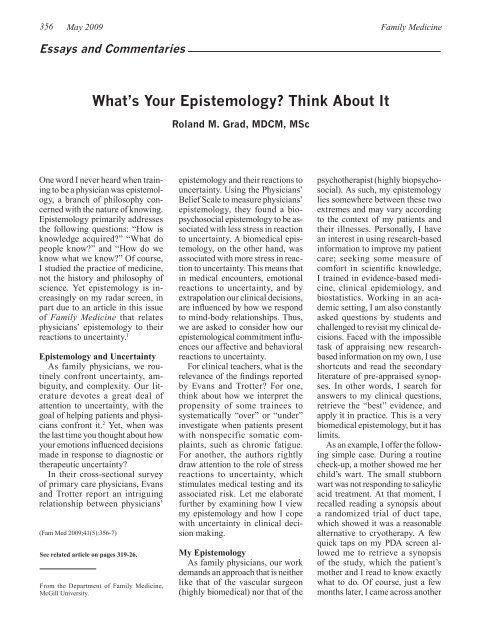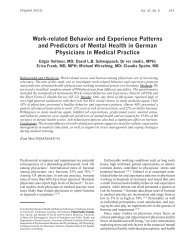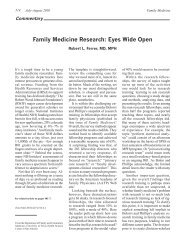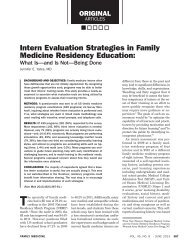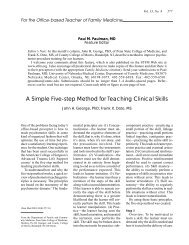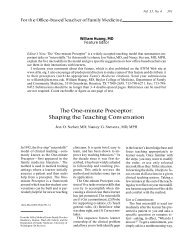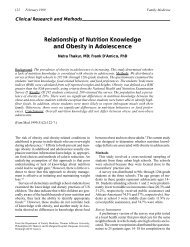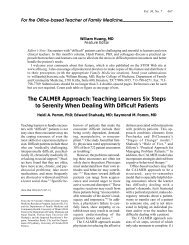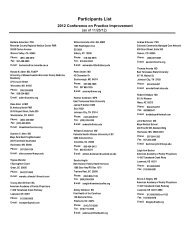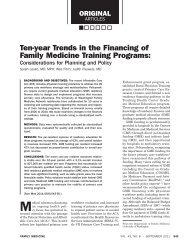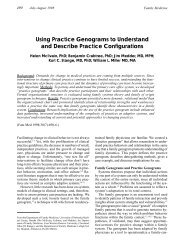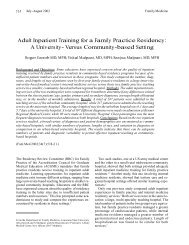What's Your Epistemology? Think About It - STFM
What's Your Epistemology? Think About It - STFM
What's Your Epistemology? Think About It - STFM
Create successful ePaper yourself
Turn your PDF publications into a flip-book with our unique Google optimized e-Paper software.
356 May 2009 Family Medicine<br />
Essays and Commentaries<br />
What’s <strong>Your</strong> <strong>Epistemology</strong>? <strong>Think</strong> <strong>About</strong> <strong>It</strong><br />
Roland M. Grad, MDCM, MSc<br />
One word I never heard when training<br />
to be a physician was epistemology,<br />
a branch of philosophy concerned<br />
with the nature of knowing.<br />
<strong>Epistemology</strong> primarily addresses<br />
the following questions: “How is<br />
knowledge acquired?” “What do<br />
people know?” and “How do we<br />
know what we know?” Of course,<br />
I studied the practice of medicine,<br />
not the history and philosophy of<br />
science. Yet epistemology is increasingly<br />
on my radar screen, in<br />
part due to an article in this issue<br />
of Family Medicine that relates<br />
physicians’ epistemology to their<br />
reactions to uncertainty. 1<br />
<strong>Epistemology</strong> and Uncertainty<br />
As family physicians, we routinely<br />
confront uncertainty, ambiguity,<br />
and complexity. Our literature<br />
devotes a great deal of<br />
attention to uncertainty, with the<br />
goal of helping patients and physicians<br />
confront it. 2 Yet, when was<br />
the last time you thought about how<br />
your emotions influenced decisions<br />
made in response to diagnostic or<br />
therapeutic uncertainty?<br />
In their cross-sectional survey<br />
of primary care physicians, Evans<br />
and Trotter report an intriguing<br />
relationship between physicians’<br />
(Fam Med 2009;41(5):356-7)<br />
See related article on pages 319-26.<br />
From the Department of Family Medicine,<br />
McGill University.<br />
epistemology and their reactions to<br />
uncertainty. Using the Physicians’<br />
Belief Scale to measure physicians’<br />
epistemology, they found a biopsychosocial<br />
epistemology to be associated<br />
with less stress in reaction<br />
to uncertainty. A biomedical epistemology,<br />
on the other hand, was<br />
associated with more stress in reaction<br />
to uncertainty. This means that<br />
in medical encounters, emotional<br />
reactions to uncertainty, and by<br />
extrapolation our clinical decisions,<br />
are influenced by how we respond<br />
to mind-body relationships. Thus,<br />
we are asked to consider how our<br />
epistemological commitment influences<br />
our affective and behavioral<br />
reactions to uncertainty.<br />
For clinical teachers, what is the<br />
relevance of the findings reported<br />
by Evans and Trotter? For one,<br />
think about how we interpret the<br />
propensity of some trainees to<br />
systematically “over” or “under”<br />
investigate when patients present<br />
with nonspecific somatic complaints,<br />
such as chronic fatigue.<br />
For another, the authors rightly<br />
draw attention to the role of stress<br />
reactions to uncertainty, which<br />
stimulates medical testing and its<br />
associated risk. Let me elaborate<br />
further by examining how I view<br />
my epistemology and how I cope<br />
with uncertainty in clinical decision<br />
making.<br />
My <strong>Epistemology</strong><br />
As family physicians, our work<br />
demands an approach that is neither<br />
like that of the vascular surgeon<br />
(highly biomedical) nor that of the<br />
psychotherapist (highly biopsychosocial).<br />
As such, my epistemology<br />
lies somewhere between these two<br />
extremes and may vary according<br />
to the context of my patients and<br />
their illnesses. Personally, I have<br />
an interest in using research-based<br />
information to improve my patient<br />
care; seeking some measure of<br />
comfort in scientific knowledge,<br />
I trained in evidence-based medicine,<br />
clinical epidemiology, and<br />
biostatistics. Working in an academic<br />
setting, I am also constantly<br />
asked questions by students and<br />
challenged to revisit my clinical decisions.<br />
Faced with the impossible<br />
task of appraising new researchbased<br />
information on my own, I use<br />
shortcuts and read the secondary<br />
literature of pre-appraised synopses.<br />
In other words, I search for<br />
answers to my clinical questions,<br />
retrieve the “best” evidence, and<br />
apply it in practice. This is a very<br />
biomedical epistemology, but it has<br />
limits.<br />
As an example, I offer the following<br />
simple case. During a routine<br />
check-up, a mother showed me her<br />
child’s wart. The small stubborn<br />
wart was not responding to salicylic<br />
acid treatment. At that moment, I<br />
recalled reading a synopsis about<br />
a randomized trial of duct tape,<br />
which showed it was a reasonable<br />
alternative to cryotherapy. A few<br />
quick taps on my PDA screen allowed<br />
me to retrieve a synopsis<br />
of the study, which the patient’s<br />
mother and I read to know exactly<br />
what to do. Of course, just a few<br />
months later, I came across another
Essays and Commentaries<br />
Vol. 41, No. 5<br />
357<br />
trial of duct tape for treating warts<br />
in children. In this better designed<br />
trial, duct tape was no more effective<br />
than corn pads (a placebo). In<br />
retrospect, the limits of relying on<br />
single studies with a relatively low<br />
level of evidence should have been<br />
apparent. But in the moment of decision<br />
making, these methodological<br />
limitations were ignored.<br />
My duct tape story is meant to illustrate<br />
the limitations of a biomedical<br />
epistemology. <strong>It</strong> is not unusual<br />
for the initial results of clinical<br />
research to be subsequently contradicted,<br />
and even the most highly<br />
cited randomized controlled trials<br />
may be challenged and refuted over<br />
time. 3 While EBM fits easily within<br />
the classical biomedical model, I<br />
now more clearly recognize the<br />
limitations of this approach.<br />
An In-between <strong>Epistemology</strong><br />
Of course, many patients in<br />
primary care require a more biopsychosocial<br />
approach. As such, in<br />
my clinical practice I often go back<br />
and forth between a biomedical and<br />
biopsychosocial epistemology.<br />
Similarly, in my research, I am<br />
neither purely quantitative nor<br />
qualitative. I have adopted a mixed<br />
methods approach. 4-8 The division<br />
of methods within health sciences<br />
as qualitative or quantitative has<br />
its roots in the different “world<br />
views” of constructivism and logical<br />
empiricism, which are usually<br />
presented as competing paradigms.<br />
Constructivism is associated with<br />
idealism, relativism, and subjectivity,<br />
while logical empiricism is associated<br />
with materialism, realism,<br />
and objectivity. Constructivism is<br />
most frequently associated with<br />
inductive qualitative studies and<br />
logical empiricism with deductive<br />
quantitative studies. Mixed methods<br />
may be conceived as methods<br />
that loop between constructivism<br />
and logical empiricism and include<br />
the notion that something can be<br />
“both socially constructed and yet<br />
real”. 9<br />
Why Bother With <strong>Epistemology</strong><br />
and Uncertainty in Medical<br />
Decision Making?<br />
If I am neither like a highly<br />
biomedical vascular surgeon or a<br />
highly biopsychosocial psychotherapist,<br />
then one limitation of<br />
the paper by Evans and Trotter<br />
needs to be made explicit. That is,<br />
a physician’s epistemology may<br />
be flexible, moving back and forth<br />
depending on the context of our<br />
clinical encounters.<br />
If we are unaware of our epistemology<br />
or how it influences clinical<br />
practice, then what benefits would<br />
such awareness bring? To what<br />
extent does experience or maturation<br />
lead to a change or shift in<br />
epistemology? Any temptation you<br />
may have to systematically administer<br />
the Physicians’ Belief Scale to<br />
trainees with whom you interact<br />
should be tempered by the consideration<br />
that these are research<br />
questions, not yet answered.<br />
In the meantime, one strategy<br />
for clinical teaching might be to<br />
acknowledge the limits of our<br />
knowledge base. Knowing that uncertainty<br />
may generate more stress<br />
for some trainees than for others,<br />
depending on epistemology, we can<br />
encourage our trainees to search<br />
for answers to clinical questions<br />
and promote discussion around<br />
the valid type of uncertainty that<br />
comes from increasing experience<br />
and awareness of our limits.<br />
Acknowledgments: I thank both Pierre Pluye and<br />
Michael Malus for their contributions.<br />
Correspondence: Address correspondence to Dr<br />
Grad, Herzl Family Practice Centre, 3755 Cote<br />
Ste Catherine Road, Montreal, Quebec H3T 1E2.<br />
514-340-8222, ext. 5851. Fax: 514-340-8300.<br />
roland.grad@mcgill.ca.<br />
Re f e r e n c e s<br />
1. Evans L, Trotter DRM. <strong>Epistemology</strong> and<br />
uncertainty in primary care: an exploratory<br />
study. Fam Med 2009;41(5);319-26.<br />
2. Bursztajn HJ, Feinbloom RI, Hamm R, Brodsky<br />
A. Medical choices, medical chances:<br />
how patients, families, and physicians can<br />
cope with uncertainty. New York: Routledge,<br />
Chapman and Hall, Inc, 1990.<br />
3. Ioannidis JPA. Contradicted and initially<br />
stronger effects in highly cited clinical research.<br />
JAMA 2005;294(2):218-28.<br />
4. Pluye P, Grad RM, Levine A, Nicolau B. Divergence<br />
of quantitative and qualitative data<br />
or results: four strategies and an exercise for<br />
novice mixed methods researchers. Journal<br />
of Multiple Research Approaches 2009, in<br />
press.<br />
5. Creswell JW, Plano-Clark VL. Designing<br />
and conducting mixed methods research.<br />
Thousand Oaks, Calif: Sage, 2007.<br />
6. Greene JC. Mixed methods in social inquiry.<br />
San Francisco: Jossey-Bass, 2007.<br />
7. Johnson RB, Onwuegbuzie AJ, Turner LA.<br />
Toward a definition of mixed methods research.<br />
Journal of Mixed Methods Research<br />
2007;1(2):112-33.<br />
8. Tashakkori A, Teddlie C. Handbook of mixed<br />
methods in social and behavioral research.<br />
Thousand Oaks, Calif: Sage, 2003.<br />
9. Hacking I. The social construction of what?<br />
Cambridge: Harvard University Press,<br />
1999.


